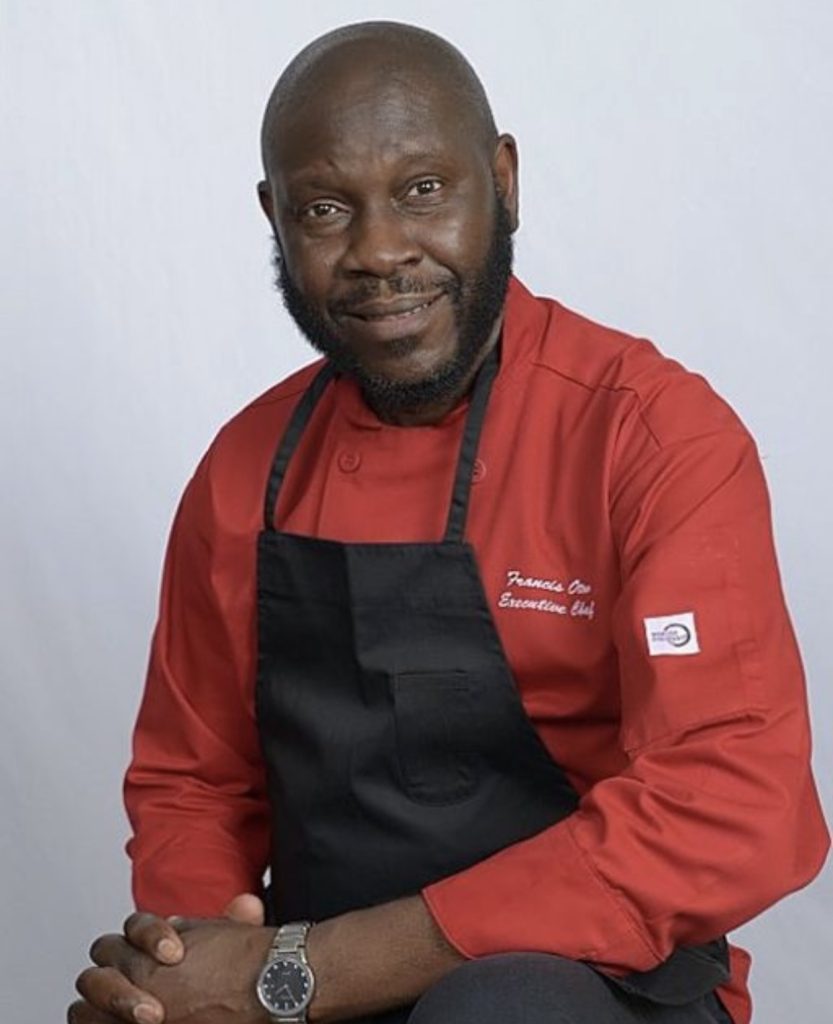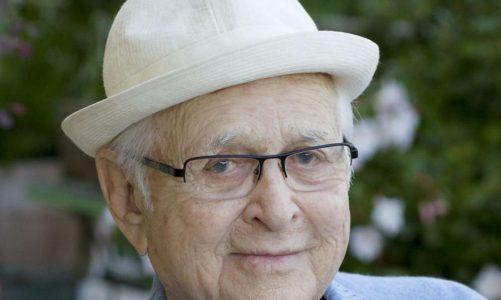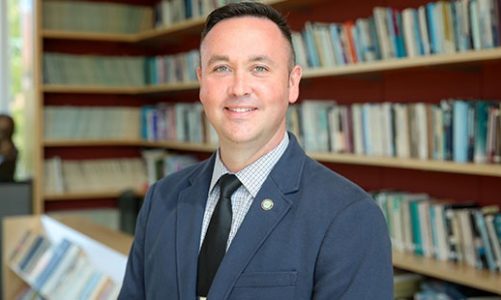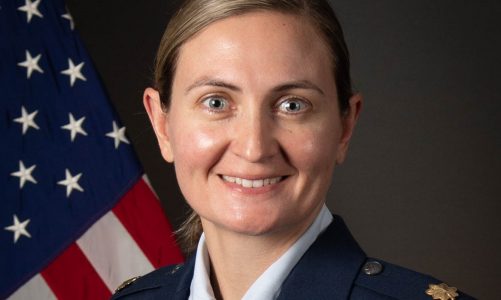
Photo credit to JCPenny.
Francis Otoo is a multiple award-winning chef with a rather humble beginning in Ghana. This interview seeks to discover more about Chef Francis and his recently published book “SERVING PRESIDENTS AND ROYALS: A MEMOIR OF AN AFRICAN CHEF.”
Stephen Arthur: You’ve risen through the ranks. What is your background?
Francis Otoo: I was born in Ghana, in West Africa, and lived in South Labadi Estate. I was raised in a single-family home, my mum’s. Then my grandparents took over because my mom had been assigned some duties to serve the nation as a military woman.
When did you first desire to become a chef?
Growing up, becoming a chef wasn’t a desire, as I wanted to be a dietitian. Financial hardships foiled this dream. However, my grandmother, who is an excellent cook, raised me, and she always had her children and grandchildren around her while cooking, especially the male children. We took it as a joke, but at some point, I took it seriously and spent most of my time in the kitchen with my grandmother, which is how I became attached to cooking.
Was Grandma’s influence from the kitchen all the training you needed?
Francis Otoo: At the age of 15, I started working as a cook to generate income to pay my tuition and to cater for my needs. I decided to pursue a cooking course but started as a dishwasher. I enrolled in culinary school at Ho Polytechnic and moved on to Accra Polytechnic where I did my Higher National Diploma (HND), including some other corresponding courses from the United Kingdom.
It isn’t common for men from your society to become chefs or cooks. Did people ever ridicule and bully you?
I didn’t have it easy because there was a lot of bullying, especially when I started home science in High School, as I was the only male in the class with about 20 girls. Colleagues began to call me names like “Kojo Besia” – (local slang for teasing men with feminine traits). Against all odds, I endure!
I’d like to discuss your book. What was your motivation to write it?
I’ve been wanting to write this book for about 10 years now. I want to leave a legacy for the generations after me. I wrote this book in honor of my late brother whom I couldn’t help until he passed. In addition, I wrote it to honor my mom, wife, and children. This book encourages young adults to achieve their biggest dreams.
How exactly did you come up with this title?
“It is captioned to reflect a young, rather insignificant boy rising to the status of serving presidents and other VIPs.”
Can you give a background to chapter three?
Chapter three is the emotional part of it because, during that time, my mother was disheartened after losing one of her children. I spoke to my brother three days before he passed. He was the oldest and had a deformity. Facing lots of rejection from outsiders, he took to drinking which ended up taking his life. His departure left a void in my heart.
For some people, losing a loved one can destroy their ambitions. How did you continue despite this sad news?
My wife was a very solid backbone and the Apostle General and Mama Rita of Royalhouse Chapel International supported me with prayers and encouragement. My wife had to hide my brother’s pictures at a point as it only brought grief. My children also helped as well.
Chapter thirteen is very interesting. It details your attempts to get your family to America while you were living and working here. How did that go?
I came to the United States on the ticket of the Ghanaian embassy with Alan Kyeremanteng (then ambassador) and had to return when he finished his term. However, I decided to stay as my visa was still active” His return back home meant the embassy no longer required my services. After this, I became a newspaper delivery guy. I began the necessary Immigration Procedure to bring my family from Ghana to the US. The process was successful and my wife joined me in the States after a year. It was now the turn of my children to go for their visas. My late father-in-law then took the kids to the embassy of the US in Ghana for their visas. I got a rather strange call from the US Embassy asking if they were speaking to the embassy of Ghana and Mr. Otoo, who still worked with the embassy, and I “lied and” said yes. The visas for the kids were issued thirty minutes later. My wife went home and brought the kids. I got to the airport and noticed everyone onboard the flight had been cleared. I began to panic as I thought a discovery had been made that I no longer worked with the embassy. To make matters worse, I heard an announcement requesting I come to the Immigration office. In fear, I ran to the parking lot and sat in my car for about 30 minutes. I gathered courage and got back to the airport and there my wife and children were. With tears in my eyes, we quickly left the airport. I was simply asked by Immigration to be given a note to change my children’s visa from an A3 to an A2. In addition, I also believe a response to support a church agenda with $500 out of $1000 I had left to myself to live on in response to a call by the Head Pastor of my church was what made a difference in my life. Following this, my family had now relocated to America, but I was still jobless! My wife would join me in doing the newspaper work every morning at 2 am. I then realized that we could start cooking for rather informal events such as neighborhood parties, weddings, church events, and the like. At one of such church events, I met a Nigerian who tasted and fell in love with my food. She was related to the Nigerian Ambassador. The Ambassador wanted a personal chef. I went for an interview and got the job. While working with the embassy, all our visas expired for almost a year. I spoke to the officials at the Nigerian Embassy and all our passports were taken and sent to the State Department. The passports all came back with A2 visas and work authorization even for the kids. My life has been a miracle since childhood. After a year, the ambassador was called home, and as such my services were no longer required. At the sendoff party for the Nigerian ambassador, the Ghanaian Ambassador Adusei was there. Martha Pobee was also there (Assistant Secretary-General for Africa in the Departments of Political and Peacebuilding Affairs and Peace Operations (DPPA-DPO)), and she could not take her eyes off me.
Martha Pobee got me a job as the official chef of the Embassy. She asked if I knew Mrs. Lane who was the head of department at the Accra Polytechnic when I was there. She selected a couple of brilliant students to work at events and I was one of such. Apparently, I had served at Martha Pobee’s wedding as a waiter when I was about 18 or 19 years old. “You are Francis Otoo’, she said and later showed me a picture of myself serving at her wedding.” I would encourage people to get the book to read.
The book, which I found a gripping read, is on Amazon. In chapter 15, you mentioned serving President Clinton – what was that like?
God has his own way of doing things. I had the opportunity to serve the President of the United States – President Clinton in Ghana. I made Palava sauce or spinach stew as popularly known in other countries with some fried plantain and white steamed rice. He was so in love with it that he looked me in the face and told me the meal was so great and that I would go far.
Did you cook this meal specially for him or did you just cook your best food for whoever was going to eat it?
One thing about me is I don’t care who is going to eat my food. I just make sure I give out the best because I don’t know when an opportunity will arise. I don’t take my cooking for granted at all.
How did you feel when he complimented you?
To be honest with you, I melted because, at that young age, I was getting an opportunity to serve as world president. That alone gave me some credentials, and I had pictures to show which have encouraged me and opened a lot of doors for me.
What has been your biggest challenge?
Challenges come here and there but I can’t pinpoint any challenge that I’ve not come out of. I believe if you allow them to weigh you down, you’ll be broken, and that is not what looking for.
You’ve won several medals. Which one stands out for you?
The main one was the Embassy Chef challenge where chefs from over 50 embassies display their cooking skills. I’ve been a competitor for almost 10 years until last year when I was promoted to judge. Winning two awards in a row that night was a big step for me. In the same year, I won the Jamaican Jet Festival gold medal, and won the Pepsi gold medal the following year. It was a dream come true. Competing with other top chefs and being judged the best was just an honor.
The end of your book talks about your end and future plans. What should we expect?
I’m not yet ready to hang up my gloves and even after retirement I would love to go to institutions to give lectures on how you can make it through life without relenting. I’m also going to write recipe books that will blend local and international cuisines together. Passion boils within me to create some form of encouragement for the younger generation to pursue their heart desires to the fullest. Hopefully, my story and legacy serve as some form of reflection to inspire hope.
*This interview was edited for length and clarity.




